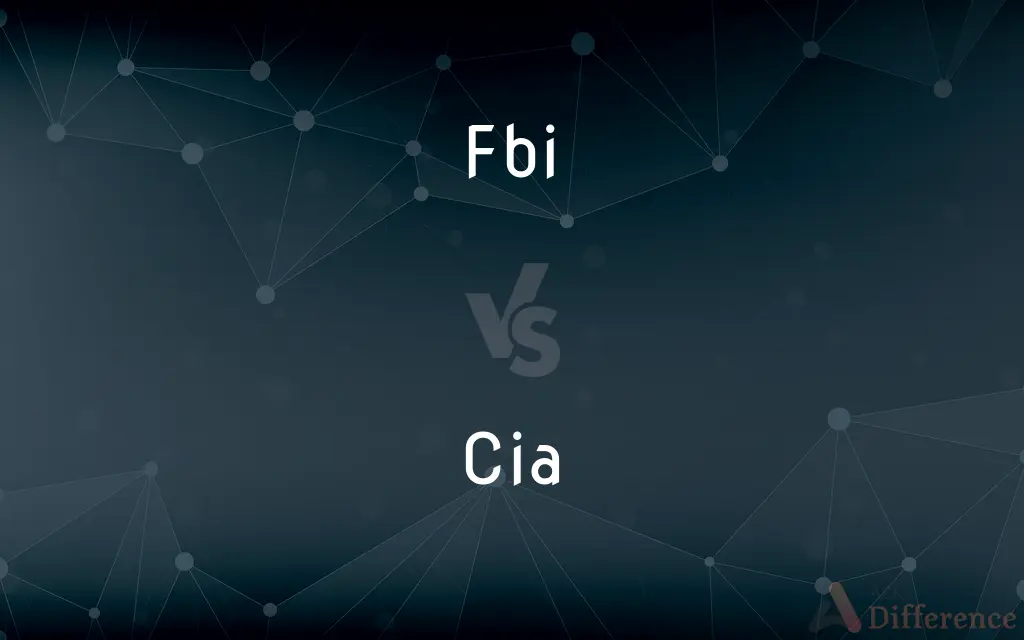FBI vs. CIA — What's the Difference?
Edited by Tayyaba Rehman — By Fiza Rafique — Updated on April 20, 2024
The FBI is a domestic security agency in the U.S. focusing on law enforcement and criminal investigations, while the CIA is primarily focused on gathering intelligence internationally.

Difference Between FBI and CIA
Table of Contents
ADVERTISEMENT
Key Differences
The Federal Bureau of Investigation (FBI) operates under the jurisdiction of the U.S. Department of Justice, serving as both a federal criminal investigative body and an internal intelligence agency. In contrast, the Central Intelligence Agency (CIA) functions as a civilian foreign intelligence service of the federal government of the United States, tasked primarily with gathering, processing, and analyzing national security information from around the world.
The FBI's duties include investigating crimes related to domestic security, such as terrorism, cybercrime, and organized crime. It also has jurisdiction over federal crimes like bank robbery and kidnapping. On the other hand, the CIA has no law enforcement function; instead, it focuses on overseas intelligence gathering, with an emphasis on providing defense and foreign policy intelligence to senior U.S. policymakers.
The FBI operates mainly within the United States and its territories or on cases that involve U.S. persons or interests abroad. It often collaborates with other U.S. law enforcement agencies at the federal, state, and local levels. Conversely, the CIA operates almost exclusively outside the United States, although it is headquartered in Langley, Virginia.
In terms of structure, the FBI is led by a Director and organizes its operations around various divisions based on different types of criminal activity. The CIA, directed by the Director of the Central Intelligence Agency, is divided into four major directorates—Operations, Analysis, Science & Technology, and Supporteach responsible for a different aspect of the agency's mission.
Training for FBI agents includes law enforcement skills and investigative techniques, applicable primarily within the U.S. legal framework. CIA officers, however, are trained in intelligence collection and operational practices with a strong focus on international affairs and often require language skills and cultural knowledge relevant to their area of assignment.
ADVERTISEMENT
Comparison Chart
Function
Domestic intelligence and law enforcement
Foreign intelligence gathering
Jurisdiction
United States and its territories
Global
Main Focus
Investigate domestic crimes and threats
Collect foreign intelligence
Law Enforcement Powers
Yes
No
Headquarters
Washington D.C.
Langley, Virginia
Compare with Definitions
Fbi
Federal Crimes.
The FBI investigates federal crimes like human trafficking and federal hate crimes.
Cia
Intelligence Analysis.
CIA analysts process and synthesize information to produce actionable intelligence reports.
Fbi
Counterterrorism.
The FBI leads initiatives to prevent and respond to terrorist activities on U.S. soil.
Cia
Global Surveillance.
The CIA conducts surveillance to gather foreign intelligence that informs U.S. foreign policy.
Fbi
Cybercrime Unit.
The FBI's Cybercrime Unit tackles crimes related to hacking and online fraud.
Cia
Covert Operations.
The CIA may engage in covert operations to gather intelligence or influence events abroad.
Fbi
Domestic Intelligence.
The FBI gathers intelligence on domestic threats, such as potential terrorist attacks within the U.S.
Cia
Non-Combatant.
CIA officers are non-combatants, focusing on information gathering, not law enforcement or military action.
Fbi
Public Service.
The FBI provides public service announcements on new crime trends and safety measures.
Cia
National Security.
The CIA contributes to national security by identifying and assessing foreign threats.
Fbi
A federal law enforcement agency that is the principal investigative arm of the Department of Justice
Cia
An independent agency of the United States government responsible for collecting and coordinating intelligence and counterintelligence activities abroad in the national interest; headed by the Director of Central Intelligence under the supervision of the President and National Security Council
Common Curiosities
What are the primary differences in the jurisdictions of the FBI and CIA?
The FBI's jurisdiction is predominantly within the U.S., focusing on domestic issues, while the CIA operates globally, focusing on foreign matters.
Can the FBI operate overseas?
Yes, the FBI can operate overseas in coordination with local authorities and other U.S. agencies, primarily to protect U.S. interests or citizens.
How does each agency contribute to U.S. national security?
Both agencies are crucial: the FBI protects against domestic threats and crime, while the CIA provides intelligence on foreign matters and threats.
How do the FBI and CIA collaborate on national security?
They collaborate by sharing intelligence and resources to address threats that may have both domestic and international dimensions.
What legal framework governs the operations of the FBI and CIA?
The FBI operates under U.S. federal law, while the CIA operates under the National Security Act and related executive orders.
What are the respective roles of the FBI and CIA in counterterrorism?
The FBI handles domestic counterterrorism investigations and operations, while the CIA gathers intelligence on terrorism that may affect U.S. interests globally.
Are the activities of the CIA subject to U.S. judicial oversight?
The CIA's activities are primarily overseen by congressional committees rather than the judiciary, to maintain secrecy and protect national security.
What type of training do FBI agents and CIA officers receive?
FBI agents receive law enforcement and investigative training, while CIA officers are trained in intelligence collection and operational practices suitable for international assignments.
How does public transparency differ between the FBI and CIA?
The FBI is somewhat more transparent due to its domestic role and interaction with U.S. law enforcement; the CIA is more secretive, given its focus on international intelligence.
Does the CIA have any law enforcement authority in the U.S.?
No, the CIA does not have law enforcement authority and is strictly an intelligence-gathering agency.
Share Your Discovery

Previous Comparison
Mall vs. Supermarket
Next Comparison
Motif vs. SymbolAuthor Spotlight
Written by
Fiza RafiqueFiza Rafique is a skilled content writer at AskDifference.com, where she meticulously refines and enhances written pieces. Drawing from her vast editorial expertise, Fiza ensures clarity, accuracy, and precision in every article. Passionate about language, she continually seeks to elevate the quality of content for readers worldwide.
Edited by
Tayyaba RehmanTayyaba Rehman is a distinguished writer, currently serving as a primary contributor to askdifference.com. As a researcher in semantics and etymology, Tayyaba's passion for the complexity of languages and their distinctions has found a perfect home on the platform. Tayyaba delves into the intricacies of language, distinguishing between commonly confused words and phrases, thereby providing clarity for readers worldwide.














































